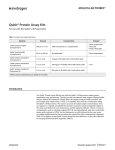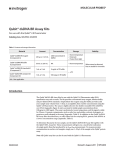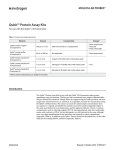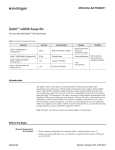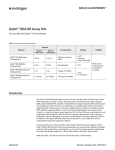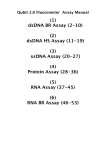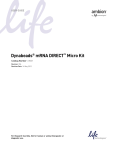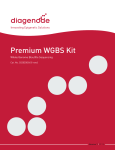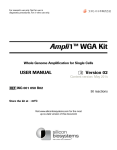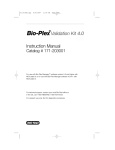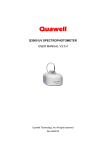Download Qubit® 2.0 Fluorometer - Thermo Fisher Scientific
Transcript
Qubit® 2.0 Fluorometer Catalog no. Q32866 Rev. Date: 4 October 2010 Manual part no. MP32866 MAN0003231 Corporate Headquarters 5791 Van Allen Way Carlsbad, CA 92008 T: 1 760 603 7200 F: 1 760 602 6500 E: [email protected] For country-specific contact information visit our web site at www.invitrogen.com User Manual Contents Product Contents...........................................................................................................3 Safety Information ........................................................................................................4 Introduction.......................................................................................... 5 Description of Qubit® 2.0 Fluorometer ......................................................................5 Product Specifications ..................................................................................................8 Methods ................................................................................................ 9 Getting Started...............................................................................................................9 Guidelines for Using the Qubit® 2.0 Fluorometer .................................................13 Calibrating the Qubit® 2.0 Fluorometer...................................................................14 Reading Samples .........................................................................................................19 Calculating the Original Sample Concentration ....................................................22 Cleaning and Maintenance........................................................................................29 Troubleshooting ..........................................................................................................30 Appendix ............................................................................................ 33 Critical Qubit™ Assay Considerations .....................................................................33 Accessory Products.....................................................................................................36 Regulatory Requirements ..........................................................................................37 Technical Support .......................................................................................................38 Purchaser Notification................................................................................................39 2 Product Contents Qubit® 2.0 Fluorometer The Qubit® 2.0 Fluorometer is shipped with the components listed below: Component Quantity ® Qubit 2.0 Fluorometer Universal Power Cord with 4 adaptor plugs (for U.S./E.U./U.K./Australia) Qubit® 2.0 USB drive (includes the instruction manual) 1 Qubit® 2.0 Fluorometer Quick Reference Card (QRC) 1 Certificate of Conformity (COC) 1 1 1 The complete instruction manual is also available on our website at www.invitrogen.com/qubit. See pages 5–8 for the description and specifications of the Qubit® 2.0 Fluorometer. Upon Receiving Examine the instrument carefully for damage incurred during transit. Ensure that all parts of the instrument, including the Instrument accessories listed above, are included with the product. Damage claims must be filed with the carrier; the warranty does not cover in-transit damage. See page 9 to install the instrument. Registering Your Visit probes.invitrogen.com/qubit to register your instrument. You will be asked to supply the serial number, your name, and Instrument your contact details. Registering your instrument ensures that you will receive notifications of software upgrades and information on new assays for use with the Qubit® 2.0 Fluorometer. Intended Use For research use only. Not intended for any animal or human therapeutic or diagnostic use. 3 Safety Information Safety Precautions Review and follow the safety instructions below. Do not install the instrument in heavy humidity, such as in a greenhouse or an incubator, to avoid a danger of electric shock. If water or other material enters the instrument, the adaptor, or power inlet, disconnect the power cord and contact a service person. For operating environment, refer to Product Specifications (page 8). Do not touch the main plug or power cord with wet hands. Always ensure that the power-supply input voltage matches the voltage available in your location. Do not install the instrument on a slant or a place prone to vibrations; vibrations increase the risk of instrument malfunction or damage. Plug the power cord firmly into the wall outlet and AC adapter. To avoid potential shock hazard, make sure that the power cord is properly grounded. Be sure to position the equipment so that it is easy to disconnect the instrument. Turn off the instrument before unplugging the power cord and/or moving the instrument. If the instrument is broken or dropped, disconnect the power cord and contact a service person. Do not disassemble the instrument. Use only authorized accessories (adaptor, power cord, and USB drive). 4 Introduction Description of Qubit® 2.0 Fluorometer Qubit® 2.0 Fluorometer The Qubit® 2.0 Fluorometer is a benchtop fluorometer for the quantitation of DNA, RNA, and protein, using the highly sensitive and accurate fluorescence-based Qubit™ quantitation assays. Use of the state-of-the-art dyes selective for dsDNA, RNA, and protein minimizes the effects of contaminants in your sample that affect the quantitation. Further, the very latest illumination and detection technologies used in the Qubit® 2.0 Fluorometer for attaining the highest sensitivity allow you to use as little as 1 μL of sample and still achieve high levels of accuracy, even with very dilute samples. Features Important features of the Qubit® 2.0 Fluorometer are: Provides a user-friendly, benchtop design for simple, fast, and highly accurate quantitation of DNA, RNA, and protein in less than 5 seconds per sample (with sample incubation times of 2 minutes for DNA and RNA, and 15 minutes for proteins). Uses the Qubit™ assays that contain advanced dyes that only fluoresce when bound to DNA, RNA, or protein. This specificity allows you to get very accurate results because Qubit™ technology only reports the concentration of the molecule of interest, not contaminants. Uses disposable assay tubes that eliminate washing steps and cross contamination between samples. Presents comprehensive data with graphic reports and a .CSV (comma separated value) file for sample comparisons. Continued on next page 5 Description of Qubit® 2.0 Fluorometer, Continued Instrument Exterior Components The image below shows the location of the various parts of the Qubit® 2.0 Fluorometer. Power Inlet connects the Qubit® 2.0 Fluorometer to an electrical outlet using the supplied power cord and the appropriate plug, based on the electrical outlet configuration in your country. Touchscreen located in the front of the instrument is the user interface containing the buttons for all the functions needed and displays data from the assays. Sample chamber is used to insert the assay tube containing the sample into the fluorometer for analysis. USB port allows you to transfer and save data to your computer for record keeping and printing purposes. The Qubit® 2.0 USB drive supplied with the instrument or any other standard USB drive is inserted into the USB port for data transfer. Continued on next page 6 Description of Qubit® 2.0 Fluorometer, Continued User Interface Use the touch screen of the Qubit® 2.0 Fluorometer to operate the instrument. The touch screen consists of: The touch screen buttons to operate the instrument, including alphanumeric buttons to enter sample names. The digital display showing the data and graphs for the standards and sample. 7 Product Specifications Qubit® 2.0 Fluorometer Specifications Environmental Conditions Operating power: 100–240 VAC, 0.4 A Frequency: 50–60 Hz Electrical output: 9 VDC, 1.33 A Installation site: Indoor use only Operating temperature: 15–40°C Maximum relative humidity: 20–80%, non-condensing Instrument Specifications Instrument type: Benchtop fluorometer Instrument dimensions: 5.3” (w) × 8.5” (l) × 1.6” (h) (13.3 cm × 21.3 cm × 4 cm); oval shaped Weight: 11.5 oz (340 g) Dynamic range: 5 orders of magnitude Processing time: ≤ 5 seconds/sample Light sources: Blue LED (max ~470 nm) Red LED (max ~635 nm) Excitation filters: Blue 430–495 nm Red 600–645 nm Emission filters: Green 510–580 nm Red 665–720 nm Detectors: Photodiodes: measurement capability from 300–1,000 nm Calibration type: 2- or 3-point standard Tube type: 0.5 mL Real Time PCR (polypropylene) tubes Warm-up time: 2 seconds ® Qubit 2.0 USB Drive: 8 2 Gigabyte Methods Getting Started Installing the Qubit® 2.0 Fluorometer The Qubit® 2.0 Fluorometer is a stand-alone instrument that does not require a connection to a computer. 1. After unpacking the instrument, place the instrument on a flat, level, dry surface. 2. Plug one end of the supplied power cord into the Qubit® 2.0 Fluorometer. To the other end attach the appropriate plug adaptor, based on the electrical outlet configuration in your country. 3. Plug the power cord into the electrical outlet. Be sure to use only the power cord supplied with your instrument. Powering the instrument with an unapproved power cord may damage the instrument. 4. The instrument is automatically powered on when it is plugged in. 5. To power down the Qubit® 2.0 Fluorometer, unplug the instrument. Continued on next page 9 Getting Started, Continued Sleep Mode The Qubit® 2.0 Fluorometer has an auto-standby (i.e., sleep) mode that is triggered after 30 minutes of inactivity. You can also trigger the stand-by mode by touching the Power button ( ) located on the top left of the touch screen. To recover from the standby mode, touch anywhere on the touch screen. Recovery from standby mode returns you to the same screen present when sleep mode commenced. After 7.5 hours of inactivity, touching the screen returns you to the Home Screen (see below). Home Screen When the instrument is turned on, the Home Screen is displayed. From the Home Screen, you can proceed immediately to the quantitation assays (DNA, RNA, or protein), choose to calibrate the instrument with the appropriate standards, access the saved data, set up the date and time, or adjust the screen brightness. Continued on next page 10 Getting Started, Continued Date and Time Setup The date and time is already preset when you receive the instrument. To reset the date and time, follow these steps: 1. Press Date/Time. The Date/Time Properties Screen contains 6 roller wheels that respond to movement of a finger across the screen as if they were wheels. 2. Select the date and time by bringing the desired value to the center position on the roller wheel. Press Set to make the date/time changes. The updated date/time is displayed on the top of the window. Note: If you select Cancel, your changes are not saved and the instrument returns to the screen that was last displayed. Adjusting Screen Brightness To adjust the screen brightness, press the Brightness button ( ) located on the top right of the touch screen and move the slider bar to the desired brightness level. Continued on next page 11 Getting Started, Continued Updating the Firmware To update your Qubit® 2.0 Fluorometer with the latest firmware available from Invitrogen, follow these steps: 1. Download the latest firmware to your USB drive from our website (www.invitrogen.com/qubit). 2. Press the Version button located on the top portion of the touch screen. The Version Screen is displayed. 3. Insert the USB drive into the USB port and press Update. Note: A green dot on the Update button indicates that the instrument recognizes the USB drive; a red dot indicates that the USB drive is not inserted into the USB port or that the instrument does not recognize the USB drive. After the successful update of the firmware, the following screen is displayed before the instrument returns to the Home Screen. You can now proceed to setting your standards and quantitating your samples. 12 MEND ION AT RECOM Guidelines for Using the Qubit® 2.0 Fluorometer To obtain the best results, follow the recommendations below. For more information, see Critical Qubit™ Assay Considerations in the Appendix, pages 33–35. Do not operate the instrument in direct sunlight. Wear gloves during sample handling. Use the Qubit® 2.0 Fluorometer at room temperature only (22–28ºC). Store all kit reagents at room temperature and insert all assay tubes into the Qubit® 2.0 Fluorometer only for as much time as it takes for the instrument to measure the fluorescence. Do not hold the assay tubes in your hand before performing a measurement. Make sure that you have calibrated the Qubit® 2.0 Fluorometer using the appropriate standards. Incubate the tubes for the Qubit™ DNA and RNA assays for 2 minutes after mixing the sample or standard with the working solution. Incubate the tubes for the Qubit™ protein assays for 15 minutes after mixing the sample or standard with the working solution. If you are performing multiple readings of a single tube, remove the tube from the instrument and let it equilibrate to room temperature for 30 seconds before taking another reading. Visit www.invitrogen.com/qubit for additional application notes, technical notes, citations, firmware updates, and a list of validated Qubit™ assays that have been tested using the Qubit® 2.0 Fluorometer. Assay Tubes for the Qubit® 2.0 Fluorometer Only thin-wall, clear 0.5 mL PCR tubes are appropriate for use in the Qubit® 2.0 Fluorometer. Acceptable tubes include Qubit® assay tubes (Cat. no. Q32856, 500 tubes) or Axygen PCR-05-C tubes (VWR, part number 10011-830). The minimum assay volume must be 200 μL for an accurate read. 13 Calibrating the Qubit® 2.0 Fluorometer Introduction For each assay, you have the choice to run new standards for calibrating the Qubit® 2.0 Fluorometer or to use the values from the previous calibration (for more information, see Calibrating the Qubit® 2.0 Fluorometer in the Appendix, page 35). This section provides instructions for running new calibration standards and for using the last calibration. Note: When the fluorometer is used for the first time, there will not be an option to use the last calibration. Calibration of the Qubit® 2.0 Fluorometer requires the preparation of the appropriate standard solutions. For instructions on the preparation of these standards, see the instructions that accompany the assay you are using. Materials Needed Running New Standards for Calibration Appropriate standards for the assay you are performing Note: Incubate the standards for the appropriate amount of time after mixing them with the working solution (2 minutes for the Qubit™ DNA and RNA assays, 15 minutes for the Qubit™ protein assay). Qubit® assay tubes or other appropriate 0.5 mL assay tubes Optional: Qubit® 2.0 USB drive for data transfer, supplied with the instrument or available separately 1. On the Home Screen, choose the type of assay for which you want to run the standards. Standards Screen is automatically displayed. Continued on next page 14 Calibrating the Qubit® 2.0 Fluorometer, Continued Running New Standards for Calibration, 2. continued If you have already performed a calibration for the selected assay, Qubit® 2.0 Fluorometer will prompt you to choose between reading new standards and using the previous calibration. Note: You can also press Standards to go to the Standards Screen from any other screen. 3. Press Yes to read new standards. A prompt to insert Standard #1 appears on the screen. Continued on next page 15 Calibrating the Qubit® 2.0 Fluorometer, Continued Running New Standards for Calibration, 4. Insert Standard #1 into the Sample Chamber and press Read. Ensure that you are using the Standard #1 appropriate for the assay you are performing. The reading takes approximately 3 seconds. 5. Insert Standard #2, and press Read. Ensure that you are using the Standard #2 appropriate for the assay you are performing. 6. If you are performing the Qubit™ protein assay, which requires a three-point calibration, insert Standard #3 when prompted, and then press Read. continued The calibration is complete after Standard #2 is read (or after Standard #3 is read for the Qubit™ protein assay). The new standards graph with data points for standards connected by a line appears on the screen. Continued on next page 16 Calibrating the Qubit® 2.0 Fluorometer, Continued Using the Last Calibration In the Fluorescence vs. Concentration graph, open circles represent correct standards, black circles represent samples that fall within the assay's range, and red circles represent samples or standards that are not within the assay’s range. The most recent sample is signified by a large black circle. A “Standards Incorrect” message indicates an error. Checking the calibration values may help you to determine the source of your error. See Checking Standards, next page. You can choose to apply the previous calibration to your sample readings by pressing No when the Qubit® 2.0 Fluorometer prompts you to choose between reading new standards and using the previous calibration. You are then directed to insert the assay tube containing your sample. Continued on next page 17 Calibrating the Qubit® 2.0 Fluorometer, Continued Checking Standards The Check Standards Screen displays the raw fluorescence values for Standard #1, Standard #2, Standard #3 (if applicable), and the last measurement taken for a given assay. These values can assist you in making a judgment regarding the performance of the Qubit® 2.0 Fluorometer and whether or not the samples you used were within range. For the Qubit™ dsDNA BR, Qubit™ dsDNA HS, Qubit™ ssDNA, Qubit™ RNA, and Qubit™ RNA BR assays, the reading given by Standard #2 should be much higher than that of Standard #1, and the reading of your sample should fall somewhere between that of the two Standards. For the Qubit™ protein assay, the reading given by Standard #3 should be much higher than that of Standard #2, and the reading of your sample should be no more than 50% greater than Standard #3. To access the Check Standards Screen, press Check Stds. on the Standards Screen. The raw fluorescence values for the standards and the last sample will be displayed on the screen. 18 Reading Samples Introduction After you have completed the calibration of the Qubit® 2.0 Fluorometer by running the appropriate standards for the assay you want to use or have accepted the values from the previous calibration, you are ready to read your samples. This section provides instructions for using the Qubit® 2.0 Fluorometer to quantitate your DNA, RNA, or protein samples with the appropriate Qubit™ assay. It is important to prepare the sample correctly before a reading is taken. For instructions on the preparation of your samples, see the instructions that accompany the assay you are using. Materials Needed Qubit™ assay kit you want to use to quantitate your samples (see page 33 for available Qubit™ assay kits and ordering information) Your DNA, RNA, or protein samples Note: Incubate the samples for the appropriate amount of time after mixing them with the working solution (2 minutes for the Qubit™ DNA and RNA assays, 15 minutes for the Qubit™ protein assay). Reading Samples Qubit® assay tubes or other appropriate 0.5 mL assay tubes Optional: Qubit® 2.0 USB drive for data transfer, supplied with the instrument or available separately 1. Choose Sample to go to the Sample Screen. Continued on next page 19 Reading Samples, Continued Reading Samples, 2. Insert a sample into the Sample Chamber and press Read. The measurement takes approximately 3 seconds. continued Upon the completion of the measurement, the result is displayed on the screen. The number displayed is the concentration of the nucleic acid or protein in the assay tube. To calculate the concentration of your original sample, see Calculating the Original Sample Concentration, page 22. 3. To read the next sample, remove the sample from the Sample Chamber, insert the next sample, and press Read Next Sample. 4. Repeat sample readings until all samples have been read. Continued on next page 20 Reading Samples, Continued Notes on Using Graphs Pressing Hide Graph hides the Fluorescence vs. Concentration graph and the screen only displays the latest measurement. Note that the Hide Graph function is not available on the Standards Screen. Pressing Show Graph brings the graph back onto the screen. Pressing Clear Graph removes all sample data from the Fluorescence vs. Concentration graph, but keeps the standards data. Qubit® 2.0 Fluorometer automatically stores numeric data from all reads, but does not store graphic data or calculations. To save all data and calculations to the Qubit® 2.0 USB Drive, see Saving the Data to the Qubit® 2.0 USB Drive on page 27. 21 Calculating the Original Sample Concentration Introduction The Dilution Calculator feature of the Qubit® 2.0 Fluorometer calculates the concentration of your original sample based on the volume of sample you have added to the assay tube. Dilution Calculator 1. To calculate the concentration of your original sample, press Calculate Stock Conc. The Dilution Calculator Screen containing the volume roller wheel is displayed. 2. Using the volume roller wheel, select the volume of your original sample that you have added to the assay tube. When you stop scrolling, the Qubit® 2.0 Fluorometer calculates the original sample concentration based on the measured assay concentration. Continued on next page 22 Calculating the Original Sample Concentration, Continued Dilution Calculator, 3. To change the units in which the original sample concentration is displayed, press ng/mL. A pop-up window showing the current unit selection (as indicated by an adjacent red dash) opens. 4. Select the unit for your original sample concentration by touching the desired unit in the unit selection pop-up window. To close the unit selection pop-up window, touch anywhere on the screen outside the pop-up. continued The Qubit® 2.0 Fluorometer automatically converts the units to your selection when the unit selection pop-up window is closed. Note: The unit button next to your sample concentration reflects the change in the units (e.g., if you change the unit to pg/μL, the button displays pg/μL). 5. To save the data from your calculation, see Saving the Calculation to the Qubit® 2.0 Fluorometer, next page. 6. To exit the Dilution Calculator Screen, press any navigator button on the bottom of the screen or Read Next Sample. Note: When you navigate away from the Dilution Calculator Screen, the Qubit® 2.0 Fluorometer saves the last values for the sample volume and the units in the Dilution Calculator Screen only. Returning to the Dilution Calculator Screen displays these last selected values. Continued on next page 23 Calculating the Original Sample Concentration, Continued Saving the Calculation to the Qubit® 2.0 Fluorometer 1. To save the data from your calculation to the Qubit® 2.0 Fluorometer, press Save on the Dilution Calculator Screen. The last calculated value of your measurement is saved in the .CSV file and tagged with a time and date stamp. 2. To review, rename, and save the data to the Qubit® 2.0 USB drive, see Data Handling, next page. 24 Data Handling Introduction The Qubit® 2.0 Fluorometer presents comprehensive data with graphic reports, and it allows saving of data as a .CSV (comma separated value) file for sample comparisons. Each measurement data point in the .CSV file is numbered and exhibits a time and date stamp. Reviewing the Data 1. To review the data saved on the Qubit® 2.0 Fluorometer, press Data on any screen. The Data Screen displays the data in a spreadsheet format with additional data columns hidden to the right. The most recent data point is displayed in the first line of the spreadsheet. 2. Drag the scrollbars with a finger to move continuously across the spreadsheet to access the data columns hidden to the right. Continued on next page 25 Data Handling, Continued Renaming Data 1. Files Select the data file to rename by touching the corresponding line of the spreadsheet on the Data Screen. The selected line will be highlighted. If no lines are selected, you are prompted to select a line or multiple lines to rename. Note: To select multiple files, highlight each line by-one-one or press the column headers to highlight all files. To deselect all rows, simply press the column header again. 2. Press Rename to enter a name for the selected line. Alphabet Keys Screen is displayed. To switch to the Numeric Keys Screen, press 123. 3. Enter the file name using the keypad buttons displayed on the Save menu. The maximum number of characters you can enter is 20. Note: If you have selected to rename multiple lines at once, files will be differentiated by numbers at the end of the name. The numbers will appear in ascending order, with the most recent sample starting with 1 (e.g., SAMPLE_1, SAMPLE_2, etc.). 4. Press OK to save the name you have entered as the file name and to go back to the Data Screen. Continued on next page 26 Data Handling, Continued Saving the Data to the Qubit® 2.0 USB Drive The Qubit® 2.0 Fluorometer is designed for stand-alone use; it does not require the use of an external computer. However, to archive data and generate reports, you may transfer the numeric data stored in the .CSV file to your computer using the USB drive and import the file into any spreadsheet program. To archive your data: 1. Insert the Qubit® 2.0 USB drive into the USB port. 2. Press Data to access the Data Screen. Note: A green dot on the USB icon indicates that the instrument recognizes the USB drive; a red dot indicates that the USB drive is not inserted into the USB port or that the instrument does not recognize the USB drive. Continued on next page 27 Data Handling, Continued 3. Saving the Data to the Qubit® 2.0 USB Drive, continued 4. Select the data file to save by touching the corresponding line of the spreadsheet on the Data Screen. The selected line is highlighted. Note: By default, the entire .CSV file will be saved to the USB drive if no lines are selected Save your data on the USB drive by pressing the USB icon. The numeric data is automatically saved as a .CSV file that can be opened with any spreadsheet program. 5. To delete all data from the .CSV file and start with a blank file, press the Clear Data button. 6. Transfer the Qubit® 2.0 USB drive to the USB port on your PC. You may open the .CSV file using a spreadsheet program. 28 Cleaning and Maintenance Cleaning and Maintenance The Qubit® 2.0 Fluorometer does not need regular maintenance. To troubleshoot problems with the instrument, contact Technical Support (page 38). Do not perform any repairs or service on the Qubit® 2.0 Fluorometer to avoid damaging the instrument. Do not expose the Qubit® 2.0 Fluorometer to direct sunlight. Clean the surface of the Qubit® 2.0 Fluorometer with a damp cloth. To clean the touch screen, turn off the Qubit® 2.0 Fluorometer, disconnect the power cable, and clean the touch screen with a soft cloth lightly moistened with LCD cleansing detergent. Cleaning the screen with excessive force can damage the touch screen. Wipe the screen dry immediately. 29 Troubleshooting Handling Samples The calibration standards included in the Qubit™ RNA and Qubit™ RNA BR Assay Kits are high-quality rRNA standards. The integrity and concentration of these standards is critical to the optimal performance of the Qubit™ RNA assay. We highly recommend treating the rRNA standards as you would any other precious RNA. Use appropriate RNAse-free handling techniques, including RNAse-free gloves, pipette tips, and tubes. Keep the tube lids closed whenever possible; do not touch the pipet to the inside wall of the tube when withdrawing a sample, and return the rRNA standard to the refrigerator as soon as possible after use. Ensure that the assay tubes are at room temperature at the time the reading is taken. Do not hold assay tubes in your hand and do not leave assay tubes in the Qubit® 2.0 Fluorometer for longer than it takes to read the fluorescence. See Assay Temperature on page 34. Be careful not to spill sample into the sample chamber. Promptly wipe any spills. The Qubit™ assays are very sensitive and even small amounts of material from a previous sample may result in errors. Use a clean 0.5 mL PCR tube for each reading. The tube must be clean and dry on the outside when taking readings. Moisture and condensation on the tube surface can lead to reading errors. Minute bubbles in samples will cause errors in readings. Be sure not to introduce bubbles into samples. Slight tapping on the tube wall or brief centrifugation will often help dissipate bubbles. Continued on next page 30 Troubleshooting, Continued Low Reading Your sample is out of range. Use a sample that is more concentrated or use a lower dilution (i.e., 20 μL in 180 μL instead of 10 μL in 190 μL). View the Check Standards Screen to confirm that the values for the samples fall between the values of the standards (see page 18). Ensure that you have prepared the Qubit™ working solution correctly (1:200 dilution using the buffer provided in the kit). Ensure that you have prepared the standard tubes correctly (10 μL of each standard in 190 μL of Qubit™ working solution). Ensure that the standard and sample tubes are filled to 200 μL. Protect the Qubit™ reagent and working solutions from light. Select the correct Qubit® 2.0 Fluorometer assay for the Qubit™ assay you are performing and calibrate the fluorometer correctly. Standards must be used in the correct order. Ensure that the assay is performed entirely at room temperature. Continued on next page 31 Troubleshooting, Continued High Reading Your sample is out of range. Use a sample that is less concentrated. View the Check Standards Screen to confirm that the values for the samples fall between the values of the standards (see page 18). Ensure that the lid is closed while reading standards and samples. Prepare samples and standards according to the instructions in the Qubit™ assay kit you are using. Ensure that the assay is performed entirely at room temperature. 32 Appendix Critical Qubit™ Assay Considerations How the Qubit® 2.0 Fluorometer Calculates Concentration The Qubit® 2.0 Fluorometer generates concentration data based on the relationship between the two Standards used in calibration (three for the Qubit™ protein assay). The plot below shows the line corresponding to the curve-fitting algorithm (a modified Hill plot) used in the calculation of concentration data for the Qubit™ RNA assay. For reference, the positions of the Standards and a set of data points from an actual experiment are shown superimposed onto the line. This plot demonstrates that the curve-fitting algorithm gives accurate values for quantitation. Figure 1. The curve-fitting algorithm used to determine concentration in the Qubit™ RNA assay. Data for the Qubit™ dsDNA BR, Qubit™ dsDNA HS, Qubit™ ssDNA, Qubit™ RNA BR, and Qubit™ protein assays are generated by similar algorithms. Continued on next page 33 Critical Qubit™ Assay Considerations, Continued Assay Temperature The Qubit™ assays were designed to be performed at room temperature (22–28°C), and temperature fluctuations can influence the accuracy of the assay. To minimize temperature fluctuations, store all kit reagents at room temperature and insert all assay tubes into the Qubit® 2.0 Fluorometer only for as much time as it takes for the instrument to measure the fluorescence, because the Qubit® 2.0 Fluorometer can raise the temperature of the assay solution significantly, even over a period of a few minutes. Do not hold the assay tubes in your hand before a measurement, because holding the tubes warms the solution and results in a low reading. Figure 2. Effect of temperature on the Qubit™ dsDNA BR assay. Qubit™ dsDNA HS, Qubit™ ssDNA, Qubit™ RNA, Qubit™ RNA BR, and Qubit™ protein assays show similar sensitivities over the same range. Incubation Time To allow the Qubit™ assay to reach maximum fluorescence, incubate the tubes for the DNA and RNA assays for 2 minutes after mixing the sample or standard with the working solution. After this incubation period, the fluorescence signal is stable for 3 hours at room temperature, for all nucleic acid assays except the Qubit™ ssDNA assay, which is stable for up to 30 minutes. The Qubit™ protein assay requires 15 minutes of incubation for a stable signal. For greatest accuracy of the protein assay, the incubation time of the samples should be within 10 minutes of the incubation time of the standards. Continued on next page 34 Critical Qubit™ Assay Considerations, Continued Photobleaching The Qubit™ reagents exhibit high photostability in the Qubit® 2.0 Fluorometer, showing <0.3% drop in fluorescence after 9 readings of Qubit™ and <2.5% drop in fluorescence after 40 readings. It is important Reagents to remember, however, that if the assay tube remains in the Qubit® 2.0 Fluorometer for multiple readings, a temporary reduction in fluorescence will be observed as the solution increases in temperature (see Figure 2 in Assay Temperature, previous page). Note that the temperature inside the Qubit® 2.0 Fluorometer may be as much as 3°C above room temperature after 1 hour. For this reason, if you want to perform multiple readings of a single tube, remove the tube from the instrument and let it equilibrate to room temperature for 30 seconds before taking another reading. Calibrating the For each assay, you have the choice to run a new calibration or to use the values from the previous calibration. As you first use the Qubit® 2.0 instrument, you should perform a new calibration each time. As Fluorometer you become familiar with the assays, the instrument, your pipetting accuracy, and significant temperature fluctuations within your laboratory, you should determine the level of comfort you have using the calibration data stored from the last time the instrument was calibrated. Remember also that the fluorescence signal in the tubes containing the standards and the samples is stable for not longer than 3 hours. See Figure 1 in How the Qubit® 2.0 Fluorometer Calculates Concentration (page 33) for an example of the calibration curve used to generate the quantitation results. 35 Accessory Products Qubit® 2.0 Products The following products can be used with the Qubit® 2.0 Fluorometer and are available separately from Invitrogen. For more information, visit www.invitrogen.com or contact Technical Support (page 38). Quantity Catalog no. ® Product 1 each Q32866 ® 1 kit Q32871 ® Qubit Quantitation Lab Starter Kit 1 kit Q32872 Qubit® 2.0 Fluorometer USB 1 each Q32867 Qubit 2.0 Fluorometer International Power Cord (replacement) 1 each Q32868 Qubit® Assay Tubes 500 tubes Q32856 Qubit RNA BR Assay Kit *20–1,000 ng* 100 assays 500 assays Q10210 Q10211 Qubit® ssDNA Assay Kit *1–200 ng* 100 assays Q10212 Qubit dsDNA BR Assay Kit *2–1,000 ng* 100 assays 500 assays Q32850 Q32853 Qubit® dsDNA HS Assay Kit *0.2–100 ng* 100 assays 500 assays Q32851 Q32854 Qubit® RNA Assay Kit *5–100 ng* 100 assays 500 assays Q32852 Q32855 Qubit® Protein Assay Kit *0.25–5 μg* 100 assays 500 assays Q33211 Q33212 Qubit 2.0 Fluorometer Qubit Quantitation Starter Kit ® ® ® 36 Regulatory Requirements The Qubit® 2.0 Fluorometer has been tested and complies with the following regulatory requirements: U.S. and Canadian Safety Standards UL 61010-1:2004 for U.S. CAN/CSA-C22.2 No.61010-1:2004 for Canada U.S. and Canadian EMC Requirements FCC CFR 47, Part 15 Sections 15.107 and 15.109 (Class B) Industry Canada Interference Causing Equipment Standard ICES-003 Issue 4, Sections 5.3 and 5.5. (Digital apparatus) European Safety and EMC Standards 2006/95/EC Low Voltage directive (EN 61010-1:2001, EN 6101-2081:2001/A1:2003) 2004/108/EC EMC Directive (EN 61326-1:2006) 2002/95/EC RoHS directive 2002/96/EC WEEE directive Do not dispose in the regular household garbage. Dispose the battery into the special waste for batteries. Australian Directives The Australian Communication Authority (ACA) requirements for ISM Equipment AS/NZS 2064 (equivalent to EN 55011 or CISPR 11) PSE Mark for Japan Protection Class II double insulation CCC Mark for China 37 Technical Support Web Resources Contact Us Visit the Invitrogen website at www.invitrogen.com for: Technical resources, including manuals, vector maps and sequences, application notes, MSDSs, FAQs, formulations, citations, handbooks, etc. Complete technical support contact information Access to the Invitrogen Online Catalog Additional product information and special offers For more information or technical assistance, call, write, fax, or email. Additional international offices are listed on our website (www.invitrogen.com). Corporate Headquarters: 5791 Van Allen Way Carlsbad, CA 92008 USA Tel: 1 760 603 7200 Tel (Toll Free): 1 800 955 6288 Fax: 1 760 602 6500 E-mail: [email protected] Japanese Headquarters: LOOP-X Bldg. 6F 3-9-15, Kaigan Minato-ku, Tokyo 1080022 Tel: 81 3 5730 6509 Fax: 81 3 5730 6519 E-mail: [email protected] 38 European Headquarters: Inchinnan Business Park 3 Fountain Drive Paisley PA4 9RF, UK Tel: +44 (0) 141 814 6100 Tech Fax: +44 (0) 141 814 6117 E-mail: [email protected] Purchaser Notification Limited Use Label License No. 358: Research Use Only The purchase of this product conveys to the purchaser the limited, non-transferable right to use the purchased amount of the product only to perform internal research for the sole benefit of the purchaser. No right to resell this product or any of its components is conveyed expressly, by implication, or by estoppel. This product is for internal research purposes only and is not for use in commercial services of any kind, including, without limitation, reporting the results of purchaser’s activities for a fee or other form of consideration. For information on obtaining additional rights, please contact [email protected] or Out Licensing, Life Technologies Corporation, 5791 Van Allen Way, Carlsbad, California 92008. Continued on next page 39 Purchaser Notification, Continued Instrument Warranty Invitrogen (a part of Life Technologies Corporation) warrants to the original purchaser (“Purchaser”) that the Instrument (“Instrument”) will be free from defects in materials and workmanship for a period of one (1) year from the date of delivery. Invitrogen agrees, as its sole responsibility under this limited warranty, and upon prompt notice of a defect, to repair, replace or credit the purchase price, at its discretion, any Instrument discovered to be defective within the warranty period. Invitrogen will credit the account within 30 days of purchase, if the instrument is in original condition. After 30 days, Invitrogen will only replace the instrument for up to a year and no credit will be issued. Invitrogen will not accept any returned instrument that was used in HIV or other infectious disease labs. This warranty does not include repair, replacement, or refund necessitated by accident, abuse, neglect, misuse, unauthorized repair, or modification of the Instrument. The warranty will be voided if the instrument is disassembled or a customer attempted to repair the instrument. In the event that Invitrogen determines that the Instrument is in need of repair and not replacement, this Standard Warranty includes replacement parts and labor for the Instrument. This Standard Warranty does not include shipment of the Instrument to and from service location or travel cost of service engineer, the costs of which shall be borne by the Purchaser. This Warranty and the remedies set forth herein are exclusive and in lieu of all other express or implied warranties (including implied warranties of merchantability, fitness for a particular purpose and non-infringement), and no other warranties shall be binding upon Invitrogen. In no event shall Invitrogen be liable for any special, incidental or consequential damages resulting from the use or malfunction of this Instrument or the system with which it is used, even if such damages could be anticipated by Life Technologies Corporation. To obtain service during the warranty period, contact Invitrogen Technical Support for further instruction. OUT OF WARRANTY SERVICE Contact Invitrogen Technical Support. We will be happy to assist you by phone at no charge. Repair service, if needed, will be billed depending on the parts replaced and labor hours needed to repair your instrument. You will be billed for shipment of the instrument to the recommended service facility. ©2010 Life Technologies Corporation. All rights reserved. The trademarks mentioned herein are the property of Life Technologies Corporation or their respective owners. 40 Corporate Headquarters 5791 Van Allen Way Carlsbad, CA 92008 T: 1 760 603 7200 F: 1 760 602 6500 E: [email protected] For country-specific contact information visit our web site at www.invitrogen.com User Manual









































